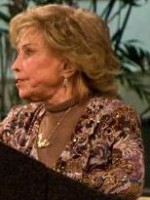Jay Ward is a Actor and Scriptwriter American born on 20 september 1920 at San Francisco (USA)

J Troplong "Jay" Ward (September 20, 1920 – October 12, 1989) was an American creator and producer of animated TV cartoon shows. He produced animated series based on such characters as Crusader Rabbit, Rocky & Bullwinkle, Dudley Do-Right, Peabody and Sherman, Hoppity Hooper, George of the Jungle, Tom Slick, and Super Chicken. His company, Jay Ward Productions, designed the trademark characters for the Cap'n Crunch, Quisp, and Quake breakfast cereals and it made TV commercials for those products. Ward produced the nonanimated series Fractured Flickers that featured comedy redubbing of silent films.
Jay Ward was raised in Berkeley, California, and he earned his undergraduate degree at the University of California at Berkeley. He also received an MBA from Harvard University. His first career was real estate. Even when his animation company was at the height of its success, he continued to own his own real estate firm as a "fallback" business. Jay Ward was married to Ramona "Billie" Ward. He had three children: Ron, Carey, and Tiffany. He and his wife collected African masks, and their collection is now part of the permanent collection of the Michelson Museum of Art in Marshall, Texas.
Animation career
Ward moved into the young mass medium of television with the help of his childhood friend, the animator Alex Anderson. Taking the character Crusader Rabbit to NBC-TV and the pioneering distributor of TV-programs, Jerry Fairbanks, they put together a pilot film, The Comic Strips of Television, featuring Crusader Rabbit, Hamhock Bones, a parody of Sherlock Holmes, and Dudley Do-Right, a bumbling Canadian Mountie.
NBC-TV and Fairbanks were both unimpressed with all but Crusader Rabbit. The animated series Crusader Rabbit premiered in 1949 and continues its initial run through 1952. Adopting a serialized, mock-melodrama format, it followed the adventures of Crusader and his dimwitted sidekick Rags the Tiger. It was, in form and content, much like the series that would later gain Ward enduring fame, Rocky and His Friends.
Rocky and Bullwinkle
Ward and Anderson lost the rights to the Crusader Rabbit character, and a new color Crusader Rabbit series under a different producer premiered in 1956. Ward then pursued an unsold series idea, The Frostbite Falls Revue. Taking place in a TV studio in the North Woods, the proposed series featured a cast of eccentrics such as newsman Oski Bear and two minor characters named Rocky the Flying Squirrel and Bullwinkle J. Moose, described in the script treatment as a "French-Canadian moose." This was the genesis of what would become Rocky and His Friends and later, The Bullwinkle Show, when NBC gave Rocky's sidekick top billing.
Premiering on ABC in 1959 (and moving to NBC two years later), the series contained a mix of sophisticated and low-brow humor. Thanks to Ward's genial partner Bill Scott (who contributed to the scripts and voiced Bullwinkle and other characters) and their writers, puns were used often and shamelessly: in a "Fractured Fairy Tales" featuring Little Jack Horner, upon pulling out the plum, Jack announced, "Lord, what foods these morsels be!" Self-referential humor was another trademark: in one episode, the breathless announcer (William Conrad) gave away the villain's plans, prompting the villain to grab the announcer from offscreen, bind and gag him, and deposit him visibly within the scene. The show skewered popular culture, taking on such subjects as advertising, college sports, the Cold War, and TV itself. The hapless duo from Frostbite Falls, Minnesota, blundered into unlikely adventures much as Crusader and Rags had before them, pursued by "no-goodnik" spies Boris Badenov and Natasha Fatale, perennially under orders to "keel moose and squirrel." The segments were serialized, generally ending on a cliffhanger; the announcer would urge the viewer to "tune in next time" for the next adventure, featuring two puns in the titles, like "Mine Eyes Have Seen the Gory, or, Moose's in the Cold, Cold Ground" and "When a Felon Needs a Friend, or, Pantomime Quisling." "Jay loved to hear me read the jokes out loud," Scott said in an interview. "I’d do all the voices. I’d never done this kind of thing, but I went through radio training when I was going to school in Denver."
In a running-joke tribute to Ward, many of his cartoon characters had the middle initial "J.", presumably standing for "Jay" (although this was never stated explicitly). The cartoonist Matt Groening later gave the middle initial "J." to many of his characters as a tribute to Jay Ward.
Ward fought many heated battles over content with the network and sponsor, but had little fear of censorship or lawsuits. The "Kirward Derby", a bowler hat that made everyone stupid and Bullwinkle a genius, was named (as a spoonerism) for Durward Kirby, sidekick of the 1950s and 1960s TV host Garry Moore and the co-host of Alan Funt's Candid Camera. When CBS tried to sue, Ward quipped, "We need the publicity. This was often a punchline in gags such as:
Rocky: "I think somebody's trying to kill us!"
Bullwinkle: "Well, don't worry. We'll be renewed."
Rocky: "I wasn't talking about the Bullwinkle Show."
Bullwinkle: "Well, you'd better! We could use the publicity!"
An eccentric and proud of it, Ward was known for pulling an unusual publicity stunt that coincided with a national crisis. Ward bought an island in Minnesota near his home and dubbed it "Moosylvania," based upon the home of his most famous TV character Bullwinkle. He and publicist Howard Brandy crossed the country in a van, gathering signatures on a petition for statehood for Moosylvania. They then visited Washington, D.C., and attempted to gain an audience with President John F. Kennedy. They arrived at the White House during the time of the Cuban Missile Crisis and were escorted off the grounds at gunpoint.
Early in his career, Ward was involved in two near-fatal incidents. He was run over by a car just outside his office, and he later received incorrect medical treatment while hyperventilating in an airplane. He then developed agoraphobia.
Source : Wikidata
Jay Ward

- Infos
- Photos
- Best films
- Family
- Characters
- Awards
Birth name J Troplong Ward
Nationality USA
Birth 20 september 1920 at San Francisco (USA)
Death 12 october 1989 (at 69 years) at Los Angeles (USA)
Creator of Jay Ward Productions
Nationality USA
Birth 20 september 1920 at San Francisco (USA)
Death 12 october 1989 (at 69 years) at Los Angeles (USA)
Creator of Jay Ward Productions
Biography
Early lifeJay Ward was raised in Berkeley, California, and he earned his undergraduate degree at the University of California at Berkeley. He also received an MBA from Harvard University. His first career was real estate. Even when his animation company was at the height of its success, he continued to own his own real estate firm as a "fallback" business. Jay Ward was married to Ramona "Billie" Ward. He had three children: Ron, Carey, and Tiffany. He and his wife collected African masks, and their collection is now part of the permanent collection of the Michelson Museum of Art in Marshall, Texas.
Animation career
Ward moved into the young mass medium of television with the help of his childhood friend, the animator Alex Anderson. Taking the character Crusader Rabbit to NBC-TV and the pioneering distributor of TV-programs, Jerry Fairbanks, they put together a pilot film, The Comic Strips of Television, featuring Crusader Rabbit, Hamhock Bones, a parody of Sherlock Holmes, and Dudley Do-Right, a bumbling Canadian Mountie.
NBC-TV and Fairbanks were both unimpressed with all but Crusader Rabbit. The animated series Crusader Rabbit premiered in 1949 and continues its initial run through 1952. Adopting a serialized, mock-melodrama format, it followed the adventures of Crusader and his dimwitted sidekick Rags the Tiger. It was, in form and content, much like the series that would later gain Ward enduring fame, Rocky and His Friends.
Rocky and Bullwinkle
Ward and Anderson lost the rights to the Crusader Rabbit character, and a new color Crusader Rabbit series under a different producer premiered in 1956. Ward then pursued an unsold series idea, The Frostbite Falls Revue. Taking place in a TV studio in the North Woods, the proposed series featured a cast of eccentrics such as newsman Oski Bear and two minor characters named Rocky the Flying Squirrel and Bullwinkle J. Moose, described in the script treatment as a "French-Canadian moose." This was the genesis of what would become Rocky and His Friends and later, The Bullwinkle Show, when NBC gave Rocky's sidekick top billing.
Premiering on ABC in 1959 (and moving to NBC two years later), the series contained a mix of sophisticated and low-brow humor. Thanks to Ward's genial partner Bill Scott (who contributed to the scripts and voiced Bullwinkle and other characters) and their writers, puns were used often and shamelessly: in a "Fractured Fairy Tales" featuring Little Jack Horner, upon pulling out the plum, Jack announced, "Lord, what foods these morsels be!" Self-referential humor was another trademark: in one episode, the breathless announcer (William Conrad) gave away the villain's plans, prompting the villain to grab the announcer from offscreen, bind and gag him, and deposit him visibly within the scene. The show skewered popular culture, taking on such subjects as advertising, college sports, the Cold War, and TV itself. The hapless duo from Frostbite Falls, Minnesota, blundered into unlikely adventures much as Crusader and Rags had before them, pursued by "no-goodnik" spies Boris Badenov and Natasha Fatale, perennially under orders to "keel moose and squirrel." The segments were serialized, generally ending on a cliffhanger; the announcer would urge the viewer to "tune in next time" for the next adventure, featuring two puns in the titles, like "Mine Eyes Have Seen the Gory, or, Moose's in the Cold, Cold Ground" and "When a Felon Needs a Friend, or, Pantomime Quisling." "Jay loved to hear me read the jokes out loud," Scott said in an interview. "I’d do all the voices. I’d never done this kind of thing, but I went through radio training when I was going to school in Denver."
In a running-joke tribute to Ward, many of his cartoon characters had the middle initial "J.", presumably standing for "Jay" (although this was never stated explicitly). The cartoonist Matt Groening later gave the middle initial "J." to many of his characters as a tribute to Jay Ward.
Ward fought many heated battles over content with the network and sponsor, but had little fear of censorship or lawsuits. The "Kirward Derby", a bowler hat that made everyone stupid and Bullwinkle a genius, was named (as a spoonerism) for Durward Kirby, sidekick of the 1950s and 1960s TV host Garry Moore and the co-host of Alan Funt's Candid Camera. When CBS tried to sue, Ward quipped, "We need the publicity. This was often a punchline in gags such as:
Rocky: "I think somebody's trying to kill us!"
Bullwinkle: "Well, don't worry. We'll be renewed."
Rocky: "I wasn't talking about the Bullwinkle Show."
Bullwinkle: "Well, you'd better! We could use the publicity!"
An eccentric and proud of it, Ward was known for pulling an unusual publicity stunt that coincided with a national crisis. Ward bought an island in Minnesota near his home and dubbed it "Moosylvania," based upon the home of his most famous TV character Bullwinkle. He and publicist Howard Brandy crossed the country in a van, gathering signatures on a petition for statehood for Moosylvania. They then visited Washington, D.C., and attempted to gain an audience with President John F. Kennedy. They arrived at the White House during the time of the Cuban Missile Crisis and were escorted off the grounds at gunpoint.
Early in his career, Ward was involved in two near-fatal incidents. He was run over by a car just outside his office, and he later received incorrect medical treatment while hyperventilating in an airplane. He then developed agoraphobia.
Usually with
Filmography of Jay Ward (5 films)
Actor
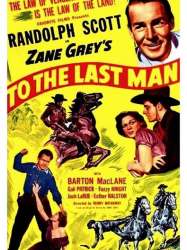
To the Last Man (1933)
, 1h10Directed by Henry Hathaway
Origin USA
Genres Romance, Western
Actors Randolph Scott, Esther Ralston, Buster Crabbe, Jack La Rue, Barton MacLane, Noah Beery Sr.
Rating62%





A feud between the Colby and the Hayden families, starts in the hills of Kentucky and continues in the West after the American Civil War. Also involved is the conflict between vigilantism and the law in a frontier environment, and lovers from the two feuding families. At one point, one of the villains shoots the head off Shirley Temple's character's doll.
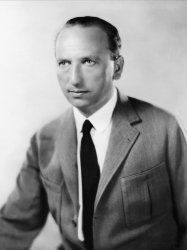
Goodbye Again (1933)
, 1h6Directed by Michael Curtiz
Origin USA
Genres Comedy, Romantic comedy, Romance
Themes Films based on plays
Actors Warren William, Joan Blondell, Genevieve Tobin, Hugh Herbert, Wallace Ford, Helen Chandler
Roles Theodore Clayton
Rating62%





Anne Rogers est la secrétaire de Kenneth Bixby, un auteur de nombreux romans best-sellers. Lors d'une tournée de conférences, il rencontre Julie Wilson, une ancienne amie, qui croit qu'elle est la source d'inspiration pour son dernier roman. Ayant entendu parler de Bixby tout au long de son mariage, le mari de Julie le déteste, même s'il ne l'a jamais rencontré. Julie est déterminé à raviver leur romance, et pendant ce temps Anne prend soin du mari.
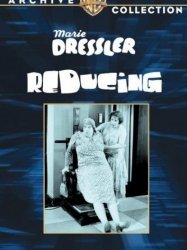
Reducing (1931)
, 1h17Directed by Charles Reisner
Origin USA
Genres Comedy, Comedy-drama
Actors Marie Dressler, Polly Moran, Anita Page, Lucien Littlefield, William Collier Jr., Sally Eilers
Roles Marty Truffle
Rating62%





The snobbish Madame Pauline "Polly" Rochay operates an exclusive beauty parlor in New York City that specializes in weight reduction. When she learns that her sister, Marie Truffle, is destitute, Polly decides to take her, her husband Elmer and their three children, Vivian, Jerry and Marty, from South Bend, Indiana, into her home. Joyce, Polly's socialite daughter, objects to her mother's decision, insisting that the Truffles are too unrefined to live among the Rochays. When the Truffles finally arrive in the big city, Polly puts her sister to work at her salon while Elmer looks for work as a mail carrier. Joyce resents the intrusion of the ill-mannered Truffles, and Polly concurs with her when the meddlesome Marie damages the beauty parlor and her children scratch her car. One evening, while Joyce is out on a date with her playboy sweetheart, Johnnie Beasley, Marie and Polly compare their daughters' boyfriends. Polly boasts that Johnnie is the better because he is a sophisticated millionaire, while Marie informs Polly that Tommy Haverly, Vivian's boyfriend, is from one of the oldest families in South Bend. Polly then insults Marie when she tells her that Vivian will never meet the same caliber of men that Joyce meets. When Johnnie brings Joyce home, he meets Vivian and takes an immediate liking to her, which makes Joyce jealous. The next day, after spurning Tommy, Vivian goes on a lunch date with Johnnie. Joyce later accuses Vivian of trying to steal her boyfriend. At the salon, Marie makes a nuisance of herself when, after a series of errors, she accidentally locks Polly in the steam room. Later, Polly and Marie become embroiled in their daughters' quarrel over Johnnie, and Marie strikes Joyce when Joyce insults Vivian. Three months pass, and the Truffles, now settled into their own home, await the arrival of Johnnie, who has been dating Vivian and will be escorting her to a party. While Vivian and Johnnie are out on their date, the heartbroken Joyce visits Marie and begs her to intervene in her daughter's affair with the man she loves. Moved by her show of emotion, Marie agrees to help Joyce by going to Johnnie's and speaking to him on her behalf. At Johnnie's, Marie accuses the young playboy of unfairly turning Vivian's head with fancy cars, yachts and other luxuries and then giving her the gate. Marie then insists that Johnnie marry Joyce, which he agrees to do. Marie tells her daughter that Johnnie was not worthy of her love because he was only seeing her to make Joyce jealous. After Joyce and Johnnie's wedding, Polly, unaware that Marie was responsible for their reunion, calls to gloat about the news and remind Marie that Vivian should have "stayed in her own class." However, when Joyce explains Marie's involvement, Polly thanks her sister for her help, and the two forgive each other.
Scriptwriter
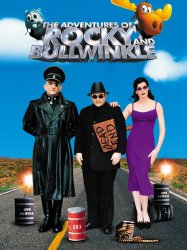 , 1h28
, 1h28Directed by Desmond McAnuff
Origin USA
Genres Comedy, Fantasy, Action, Adventure, Animation
Themes Films about magic and magicians, Buddy films, Children's films
Actors Rene Russo, Jason Alexander, Piper Perabo, Randy Quaid, Robert De Niro, June Foray
Rating42%





1964 saw the cancellation of The Rocky and Bullwinkle Show and life became rather miserable and melancholy for Rocket "Rocky" J. Squirrel and Bullwinkle J. Moose. Their home, Frostbite Falls, has been destroyed in deforestation, Rocky has lost his ability to fly, and the show's unseen Narrator lives with his mother, spending his time narrating everything that she does. Bullwinkle and Rocky head out to address the President of the United States regarding their situation, but are stopped for six months by red tape. Meanwhile, their enemies Fearless Leader, Boris Badenov, and Natasha Fatale lose power over Pottsylvania and dig to a Hollywood film studio where they convince an executive Minnie Mogul (Janeane Garofalo) to sign a contract giving her rights to the show, and the villains are transformed from their two-dimensional cel animation origins, and become live-action characters (portrayed by Robert De Niro, Jason Alexander, and Rene Russo). The klutzy FBI agent Karen Sympathy (Piper Perabo) and her boss Cappy von Trapment (Randy Quaid) inform President Signoff (James Rebhorn) that Fearless Leader intends to make himself the President by brainwashing the American public with his cable television network "RBTV" (short for "Really Bad Television"), with virtually nothing but mediocre spy film-based programming on the air. Karen is sent to a special lighthouse to bring Rocky and Bullwinkle to the real world. She succeeds, the Narrator being brought along as well but never being physically seen.

Boris and Natasha (1992)
, 1h28Directed by Charles Martin Smith
Origin USA
Genres Comedy, Action, Adventure
Actors Sally Kellerman, Dave Thomas, Andrea Martin, Paxton Whitehead, John Travolta, Christopher Neame
Rating47%





The movie opens in the tiny country of Pottsylvania, located between the countries WrestleMania and Yoursovania, where Fearless Leader concocts a plan to obtain a time-reversal microchip, invented by Professor Anton Paulovitch. He asks his top agent, Agent X (whose face is obscured), to do the assignment, but Agent X suggests they send some patsies to find Paulovitch. Boris Badenov and Natasha Fatale accept their assignment to find the Professor, and are told to defect to America. After a number of failed attempts to get there (resulting in Fearless Leader having to save them many times), they make it to America, where they are sent to the CIA. The head of the CIA, Sheldon Kaufman, decides to have tests run on them to see if they are truly defecting. After the test, it's obvious to everyone that they should be deported, but a worker, Willie, points out they hadn't had any defects in a while, and thinks they should play along and in the meantime spy on them to see what they are after.
 Connection
Connection

